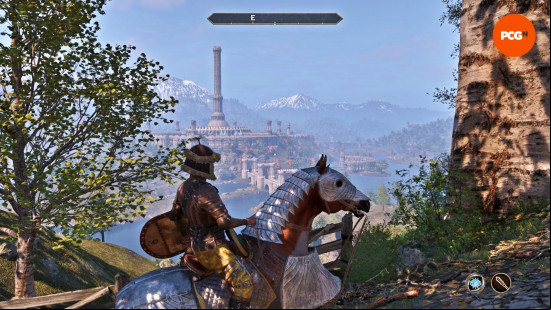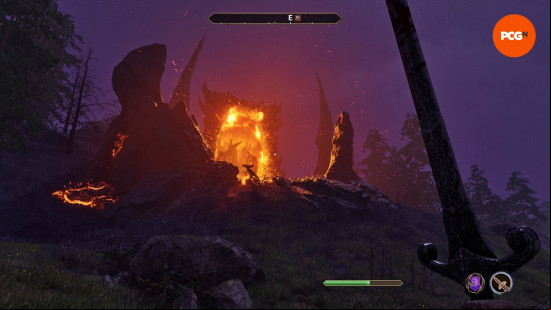Verdict
Oblivion Remastered proves that The Elder Scrolls 4 has withstood the test of time. It’s the perfect opportunity for new audiences to discover why it’s so beloved, and a nostalgic throwback to Bethesda’s golden years for older fans. However, its extensive quality-of-life features aren’t enough to excuse the endemic performance woes of Unreal Engine 5.
Remasters are funny things. They exist in an awkward halfway house between original and remake. Geriatric polygons are treated to a spit shine with Unreal Engine 5 polish until they gleam in Lumen sunlight, only for those same polygons to behave with decades-old logic. Contrast this with FF7 Remake's modern descent into metanarrative and multiverses, where plot threads are rewritten by destiny and directors who've had decades to mull over their creative decisions. Oblivion Remastered is not a remake, but it's not a straightforward remaster either.
They say that the best Elder Scrolls RPG is always your first. PCGamesN's much-missed Alex McHugh would expound the open-world games, they see a rickety precursor to the real landmark RPG.
I can't be too mad about it. Skyrim is one of the most beloved videogames of all time. Its reputation follows it from platform to platform, whether that happens to be on PC or a Samsung Smart Fridge. Its broad appeal correlates to its depth; even the most greenhorn gamer can touch the bottom. Cumulatively, my total playtime is in the hundreds, if not thousands of hours – yet I consider Skyrim the first antiseptic step Bethesda took on the path that led it directly to Starfield. You might consider this a personal bias. After my first hour in Oblivion Remastered, I almost believed that, too.

In the Imperial Sewers, the staging ground for Oblivion's tutorial, I was treated to a barrage of minor bugs I'd never encountered before. NPCs got stuck in the scenery; dialogue barks triggered in cacophonic tandem; faces contorted into a one-eyed squint. Bethesda bugs are an evergreen meme, but the novelty quickly wears thin when you encounter them in quick succession. I couldn't recall it ever being this bad. The idea that Virtuos had fiddled with Gamebryo's knobs and dials to produce a parody instead of an earnest recreation left a nasty taste in my mouth. Thankfully, the hours following the tutorial ed without issue (or rather, with the usual dose of Bethesda jank I expect), debunking that theory altogether. I've never been happier to be proven wrong.
One dead emperor later, and I'm hurtling through a main questline as familiar to me as the back of my hand. Oblivion's protagonist is dubbed the Hero of Kvatch, yet even this is a slight misnomer. You are a hero, but you are not the hero. You aren't destined to be the Dragonborn, Starborn, or whatever 'born' Bethesda decides to whip up next. Instead, the Hero of Kvatch has a closer kinship to Fallout 3's Lone Wanderer. Your destiny stretches before you, a blank canvas to fill as you wish. Your actions may result in fame or infamy, but they don't define you as a hero or villain. While the forces for good in Cyrodiil welcome your assistance, there's a prevailing sense that the events of The Elder Scrolls 4 would happen the same way without your involvement.
Unlike Fallout 4, the incidental trappings of Oblivion's main quest make it less egregious when you ignore it for the most arbitrary side quests. The Magic MacGuffin at the heart of its story can be recovered in around four or five hours if you put your mind to it, but this main quest is just a clothesline that the open world hangs upon; the excuse that gets you out of a jail cell and into the cities, caves, and mountains of Cyrodiil. Sure, the world teeters on the brink of apocalypse – but a vampire needs my help to cure his wife, a famous painter has been abducted from a locked room, and an Argonian has lost his fork. I'm just a guy dredged up from an Imperial prison cell. I've got potatoes to loot.

The joy of Oblivion's quest design lies in its proclivity for social deduction over brute strength. Its quest log often gives you a broad sense of your next steps, but you're left to the tricky business of poring through books to untangle riddles or successfully sweet-talking the locals into giving up information. Unlike other RPGs, where side quests swiftly arrange themselves into a laundry list to be fulfilled, Oblivion often sees you stumble from one to the next. Rumors picked up in ing conversation are the breadcrumbs that lead to rich questlines, while faction quests happily languish in your log until you decide they suit your character. There's an organic purpose to your pursuits that often means you can never be sure where you'll end up a few hours later. It also ensures that there's no rush. Like all the best sandbox games, you're free to go wherever the wind takes you.
I've always favored Oblivion's dungeons over Skyrim's draugr crypts, and they've never looked better. The remaster's ray tracing lends its caves, forts, and mines more ambiance, their murky shadows beaten back by torchlight or the pale glow of a magic orb. Oblivion's map is technically larger than Skyrim's, but incidental meetings stick in the mind. Alga, the Nord patron of Olav's Tap and Tack in Bruma, doesn't have a dedicated questline, but I'm well aware that she has a live-in 'husband' whom she refuses to marry in the Great Chapel of Talos. Each NPC's flavor dialogue is a window into their interiority, and these little touches lend Cyrodiil an intimacy that Skyrim lacks. By extension, it's the antithesis of Starfield.
Oblivion is grounded in low fantasy even more than Skyrim. The layout of Cyrodiil's castles flirt with historical accuracy, while surcoated knights patrol the roads on horseback and ascetic monks sequester in their priories. All these European medieval tropes are deliciously upturned once you step through an Oblivion Gate for the first time, and end up in an infernal dimension that would look right at home in Doom. Gothic towers that could comfortably host the Eye of Sauron reach towards a bloody skybox made even more arresting in Unreal Engine 5, its expanse only matched by the sea of lava marking the boundaries of each plane.

This clash between realities makes Oblivion's aesthetic so delightful; the mundanity of sleeping at an inn or haggling with a blacksmith, then strolling backwards into hell. In Oblivion, Bethesda lets you have your fantasy cake and eat it too. This follows into general character creation and roleplay. The decisions you make in of class, race, and birthsign give you a headstart, but they don't pigeonhole you into a single playstyle; in one session, I might be a stealth archer, a claymore knight, and a fire mage, all rolled into one.
Combat has never been Bethesda's strong suit, but it's particularly ropey before the iterations made in Fallout 4 and Starfield. My memories of fighting in Oblivion amount to endless swings of my melee weapon, but the remaster leans into the cadence of trading blows. New animations offer more variety when switching between melee weapon types, and ranged combat just feels better. My only major gripe is the number of times enemies run right into my shield, clipping through it before they land a hit.
Again, this is a remaster, not a remake, but there are more substantial changes here than in other remasters handled by Virtuos. Fellow Oblivion enjoyers, I would like to hold your hand when I tell you this: we can sprint. It's by far the biggest crowd-pleaser of the remaster, but even this unintrusive change can alter your approach to your character skills. That's where the more substantial overhauls come into play.

Instead of carefully juggling major skills to maximize the points available for the attributes you want to invest in, Oblivion Remastered's leveling system is far more straightforward. Not only does it take all skills into , but you're free to allocate attribute points wherever you wish. I maintain the original system's rigid logic has its charm, but I'm also self-aware enough to know that this might just be Cyrodiilian Stockholm syndrome. Oblivion's leveling system was fatally flawed; in Oblivion Remastered, getting stronger is no longer a penalty.
There are more tweaks and hotfixes in Oblivion Remastered than I could reasonably include in a review, and many more are imperceptible to all but the most dedicated fans. Minor additions appear extraneous, but still have their purpose. Take Clairvoyance, a new starter spell. A magical path to your objective seems pointless with a com marker perched at the top of the screen, but it makes the arduous trek back through dungeons a heck of a lot less confusing. Set alongside such conscientious changes, the preservation of Oblivion's level scaling is a bizarre oversight. Sure, I still appreciate the late-game challenge that scaled enemies bring, but the pain of picking up a low-level Chillrend is as fresh in the remaster as it was back in the day.
Oblivion Remastered is not a perfect game because Oblivion is not a perfect game. Dungeons are as repetitive in the remaster as ever, though they still serve as a welcome palate cleanser on the road between quests. The hellish novelty of Oblivion Gates soon wears off, until just the sight of their orange glow peeking over the horizon elicits a groan. Skyrim suffers a similar issue, but while its dragons are far more invasive, the spectacle of slaying them is still a better prospect than fighting through another Daedric mob just to get my grubby hands on another Sigil Stone. At least I can just yell at the dragons until they die.

I'm also forced to reconcile Oblivion Remastered's visuals with the mid-noughties version engraved in my memories. Uriel Septim VII has never looked better, but he's not quite how I him. Nor are the Khajits and Argonians, whose modern features gravitate away from the practical effects of an '80s fantasy film and towards digital furry art. None of this is inherently bad, just different, but the starkness of all this fidelity brooks no debate. Oblivion Remastered forces me to remove the Vaseline-smeared nostalgia goggles, and I'm not sure I like it. I'm also certain this doesn't keep first-time players like Jamie up at night.
Despite notable exceptions, the past year has been a rough ride for Unreal Engine 5. From Nightingale to Stalker 2, performance issues have dogged many videogames that employ it. Unfortunately, Oblivion Remastered also hasn't emerged unscathed. I suffer frame stutters, flickering shadows, and the occasional pixelated smear. Performance issues are frustrating but somewhat forgivable in games at the forefront of modern game design; for a remaster of a 19-year-old RPG, it's inexcusable. I'm also not sure if it was worth the sacrifice of Oblivion's lush watercolor landscapes on the altar of ultra-sharp assets.
Nevertheless, Virtuos has approached Oblivion Remastered with a lighter touch than I expected. After the sterile environments of Starfield's Settled Systems, I had my worries that we'd end up with the videogame equivalent of Cecilia Giménez getting her hands on a 19th-century fresco. To see Oblivion's rugged charm sloughed off and replaced by a smooth yet characterless veneer would be a modern tragedy. Mercifully, this was not the case. There are some other changes – character origins, a slicker UI, new voice lines – but I can take or leave them. Was an Oblivion remaster necessary? I don't think so. The original is dated, but not so much that it's unplayable. If anything, Morrowind is the Elder Scrolls crying out for such treatment. However, if an Oblivion remaster has to exist, it's safe to say I'm happy with this one.
